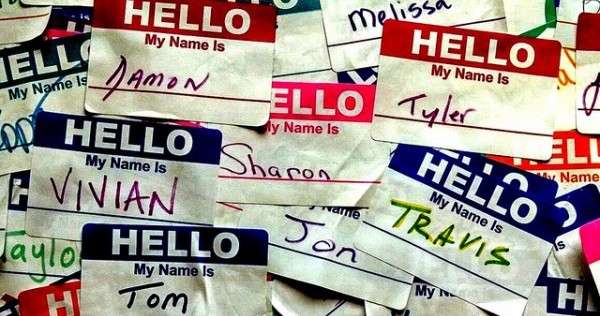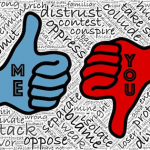
Galen Broaddus (atheist blogger at Across Rivers Wide): Hey everyone! Today we’re talking labels.
There are a couple of things going on lately that have me thinking about this. One is that the Atheist Channel here at Patheos is now the Nonreligious Channel, and while there’s been plenty of praise of the change, there has (perhaps unsurprisingly) been a lot of consternation — and more than a few people claiming (falsely) that new Patheos management wanted to get “atheist” out of the channel menu. So labels have been a big part of that conversation.
The other is something that was mentioned in a comment made in a conversation that started from last week’s post on language, which I’m going to quote in part† here:
Another thing to ponder/discuss – the idea of labeling. You all talk about your own personal labels that you have self selected (well, maybe not Hind as much although potentially she would put progressive/moderate in front of Muslim). What I’m wondering about is how do we open interfaith dialogue to also talk about what people want to be labeled as, in a religious sense, vs. what people label us as. […] So, as we are beginning to live in a world where people are more comfortable with ticking “none” in their categorical boxes or we are more willing to (or potentially need to) define what we mean when we label ourselves, is there room in our little interfaith corner for this conversation to happen? I think about this when I think of speed faith sessions. Yes, these sessions are vital, but how do we talk about language and identification in a way that denotes groups but also individual preferences and beliefs?
I don’t think I have any specific place I’d like the conversation to go, but those could help get us somewhere.
Andy Gill (progressive Christian blogger at Andy Gill): To immediately answer your question, I think, yes, we are beginning to live in a world where people are more comfortable with ticking “none.” I’m not sure if this is going to stick, as millennials grow older, the economy’s future is in the air, and, IMO, that leaves us at a point in which I’m personally unsure how educated our future children/generations will be. Also, I’m not sure what speed faith sessions are?
Hind Makki (Muslim blogger at Hindtrospectives): Speed faith sessions are basically mini introductions to a faith, usually by someone who is part of that faith. The challenge in speed faith sessions is that the presenter is constrained by time and typically isn’t able to get into the nuances of what the faith professes, what believers believe, and what believers practice. There’s just no time to dissect the diversity found within the faith tradition, so the speed faith session usually ends up being a Wikipedia-like “Religion 101” type event, rather than sharing a messy, human experience.
Andy: Damn. That was a really good explanation.
Galen: Sounds almost like PechaKucha talks, but for religion.
The funny thing to me about labels is that they really are only supposed to be generalizations, not precise indicators of a wide variety of specific positions, but like so many things, we have concretized them into that, like religions and lifestances aren’t fluid and varied. (“We” being a generalization, of course, ha.)
They are also another instance of us sacrificing nuance for simplicity, but hell, there’s gotta be a way we can accomplish both. It just might not be labels.
Andy: So, to clarify, Galen, are you suggesting or saying that you feel the best direction might be to do away with labels all together?
Galen: Heavens no! (Sorry, I literally cannot help myself when it comes to ironic language these days.)
Hind: I think labels work for a lot of people because humans are sort of wired to categorize and place people and things in easily identifiable boxes. The challenge with regard to religion, or philosophical belief, or moral compass, is that belief and behavior are not easily categorized. I’ve lived my whole life in between being highly aware of the stereotypes about Muslims and Muslim women, and naturally itching to break those stereotypes. I don’t want to break them for breaking’s sake, but because my own lived experiences proves those stereotypes are factually incorrect.
Galen: I hear you. I just had someone send me a message recently because I had expressed a high regard for Enlightenment values, and they had only ever met atheists who were moral relativists. I was genuinely shocked, but it’s because the label is so narrow that it by necessity will gloss over a whole host of differences. The same is true for most labels, I’d guess.
Andy: What, in y’all’s opinion, would be the best way to respond, react, or approach labels, particularly in regards to the labels in which have been placed on you as individuals or the group of people in which your label associates you with?
Galen: One way is to take a very strong position in favor of the right to self-identification. This is a big thing for atheists, who often want to sweep a lot of people into the label who don’t accept it. (David Silverman of American Atheists in particular is terrible about this.) The more we openly advocate for and accept that right, the more we can get people to think of labels like this as a looser sort of affiliation rather than a determiner of all ideology.
Andy: Could you unpack that a little bit more for me, Galen? That is, what you mean by “the right to self-identification”?
Galen: Simply, the right for each individual to decide what labels they use and not have them imposed by others.
Hind: I agree with Galen. I’m all about self-identification, which is why in the first blog, I introduced myself, somewhat tongue in cheekily as “just a typical Afro-Arab, Midwestern, interfaith educating, observant Muslim woman who’s sick and tired of hearing about hijabs.” One of the critical challenges in the interfaith world is to respect the identities people have, even if those identities are not small-o-orthodox. I always say that although my behavior and experiences do not represent the totality of 1400 years of Islamic history, they are still a legitimate and valid part of that 1400-year history.
But the pushback to the “self-identification” in interfaith model is that there are “must haves” in most belief systems. Can someone call himself a Muslim if he doesn’t believe that there is one God and that Muhammad was His messenger? Because professing belief in which is literally the definition of being a Muslim…
Andy: So, are identity and/or labels nothing but illusions? (I ask, because this particular discussion has reminded me so much of Sam Harris’ sentiments stating that the self is nothing but an illusion. I’m not sure I agree with him fully… but he makes many thought provoking statements.)
Galen: To your point, Andy, I don’t know how much I agree that the self is an illusion, but to the extent it is, I think identity and self-identification would be useful fictions, anyway.
And to yours, Hind…yeah, that’s where things get complicated.
Andy: So then, Hind and Galen, then when someone’s life or thought doesn’t line up with the literal definition of the label in which they identify with or take on should they not take it on? Is it disrespectful to the religion (but not limited to), group or sect of those who do line up with the definition and identify with that label?
Galen: I tend to think those are edge cases, and for the most part, it’s not my place to say whether a label is disrespectful. But I’m also not entirely sure that I would place a high regard on perceived disrespect in this context. If someone told me that it was disrespectful to call myself an atheist because I think it’s fine for atheists to celebrate Christmas or whatever, I would just ignore them even if they sincerely believed that.
I would, however, say that it’s worthwhile to acknowledge where our labels deviate from cultural and communal understandings. That’s important as well, and there may be ways to mitigate that in a label.
Hind: I’m less worried about disrespecting a religion, and more interested in welcoming people — however they identify — into inclusive, healthy, and fruitful interfaith spaces. I say this as someone who is an observant Muslim who basically follows a small-o-orthodox theology. I think God is bigger than (literally, Allahu Akbar) our human foibles, squabbles, and territoriality.
Andy: But, Galen, say (similar to Hind’s example) if a person who clearly believed in God began saying they were an atheist, would this not be frustrating?
Galen: Ha, this already happens. Eight percent of atheists believe in “God or a universal spirit” and 2% are certain of this fact.
I mean, I think it’s weird, but it doesn’t frustrate me. We still go on talking about atheists just fine without considering the God-believing ones. That’s how a label should work, I think.
Andy: Galen, so, they’re excluded then from the discussion? I’m confused.
Galen: They’re not excluded; they just aren’t the focus of generalized statements. When they enter into interfaith contexts where a more individualized consideration is required, we give them the focus they deserve. I think that’s where we can really be respectful of the ways that individuals deviate from our label-based expectations.
Andy: I think that is where things can get even more complicated and that I bet they feel they deserve more consideration (but maybe not). I’m just going off of my experience within evangelicalism (which I must acknowledge is far more of in an elusive term than other labels used) that is notorious for claiming to hold the keys to heaven and will exclude, anathematize, depose anyone or anything that is in disagreement with their definition of not just Evangelicalism but Christianity at large…if that makes sense.
Galen: No, I definitely agree that marginalized voices within labels can be subtly hidden, which means that sometimes they need extra attention to feel included. That’s important in many interfaith spaces. Like Hind said last time, that’s why many marginalized voices end up in these conversations.
Hind: Regarding the marginalized voices, that’s why I think anyone holding interfaith spaces must be intentional about inclusion. We can’t jump haphazardly into conversations and spaces about people’s most deeply-held views and beliefs; otherwise, the interfaith conversations will be shallow and likely unhelpful in the long run.
Galen: For the record, since Andy totally shorted me on my label the first time around, I’m an ex-Christian, freethinking, secular humanist, skeptical, dialogue-loving atheist. For starters. 😉
Andy: I mean for me, personally, I’m still formulating my thoughts on all of this; all the while, I’m also continuing to mold and shape my own self and haven’t yet concluded on where I stand on labels (that is, if I’ll use them much in the future). I think discussions like this are odd for me in the sense that I thrive and fit best with diverse community, friends and backgrounds; this is what I’ve grown up with.
Mostly, I’m still just making sense of the rest of the world who’s not used to this (that’s a topic for another time, haha). But yeah, hoping this conversation will stimulate readers minds and provoke healthy dialogue just as we’ve all seemed to find here.
Image from Photographing Travis via Foter.com (CC BY 2.0)
† Comment has been edited slightly for format.












